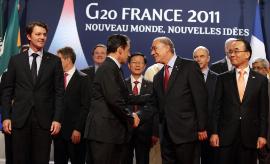Cannes, France 2011
At the Cannes Summit the G20 leaders adopted the Cannes Action Plan for Growth and Jobs. Leaders also launched the Agricultural Market Information System (AMIS) and endorsed an Action Plan on Food Price Volatility and Agriculture. A G20 Employment Task Force was set up.
Priorities
- To reform the International Monetary System (IMS).
- To strengthen financial regulation, especially in non-banking financial institutions and regulation concerning financial market integrity and transparency.
- To find collective solutions in order to reduce excessive commodity price volatility and enhance food security.
- Supporting employment and strengthening the social dimension of globalisation.
- To ensure that the Anti-Corruption Action Plan adopted in Seoul will produce concrete results and real progress starting in 2011.
- To support infrastructure development and to enhance food security in the most vulnerable countries.
Further information on the priorties of the French Presidency (Link to the web page)
OECD Contributions to Cannes
- Promoting standards for responsible investment in value chains (pdf)
- Indicators for measuring and maximizing economic value added (pdf)
- Supporting the Development of More Effective Tax Systems (pdf)
- Price Volatility in Food and Agricultural Markets: Policy Responses (Web page)
- Joint report by IEA, OPEC, OECD and World Bank on fossil-fuel and other energy subsidies (Web page)
Main achievements
The approval of the Cannes Action Plan on Growth and Jobs by G20 Leaders was an important step to consolidate the role of the G20 as a coordinating and convergence mechanism for the world economy. The OECD played a pivotal role in the elaboration of this Action Plan, with specific emphasis on structural reform commitments. The Summit also delivered results in the areas of development, employment and anti-corruption; the OECD was prominently associated to these outcomes.
The OECD was particularly instrumental in moving forward the French Presidency’s priorities, among which food security, tax transparency and employment. The OECD contributed for instance to the inception of the Action Plan on Food Price Volatility and Agriculture and played a critical role in the successful French initiative to establish effective mechanisms aimed at reducing food price volatility (the Agriculture Market Information System and its associated Rapid Response Forum).
The results achieved in the G20 tax agenda were also notable. With ever increasing membership and the implementation of numerous peer-reviews, the OECD-hosted Global Forum showed how effective coordination and collective action, supported by G20 political momentum, can enhance global regulations and strengthen globalisation rules of the game. In addition, G20 countries signed – or committed to sign – the OECD/Council of Europe Multilateral Convention on Mutual Administrative Assistance in Tax Matters and its amending protocol (that provides for automatic exchange of information) and encouraged non-G20-jurisdictions to sign it.
Finally, the G20 set up the Task Force on Employment (TFE), which held its inaugural meeting in December 2011. The OECD worked closely with the French Presidency to define the TFE’s terms of reference, and subsequently with the Mexican Presidency to make it operational, for instance by providing inputs to the Task Force’s paper on “G20 Strategies for Youth Employment”.
Speeches
- G20 Statement: Tangible progress, but work to do (Angel Gurría)
- Roundtable on Commodities and Raw Materials (Angel Gurría)
- G20 Leaders Summit: Financial Regulation Session (Angel Gurría)


